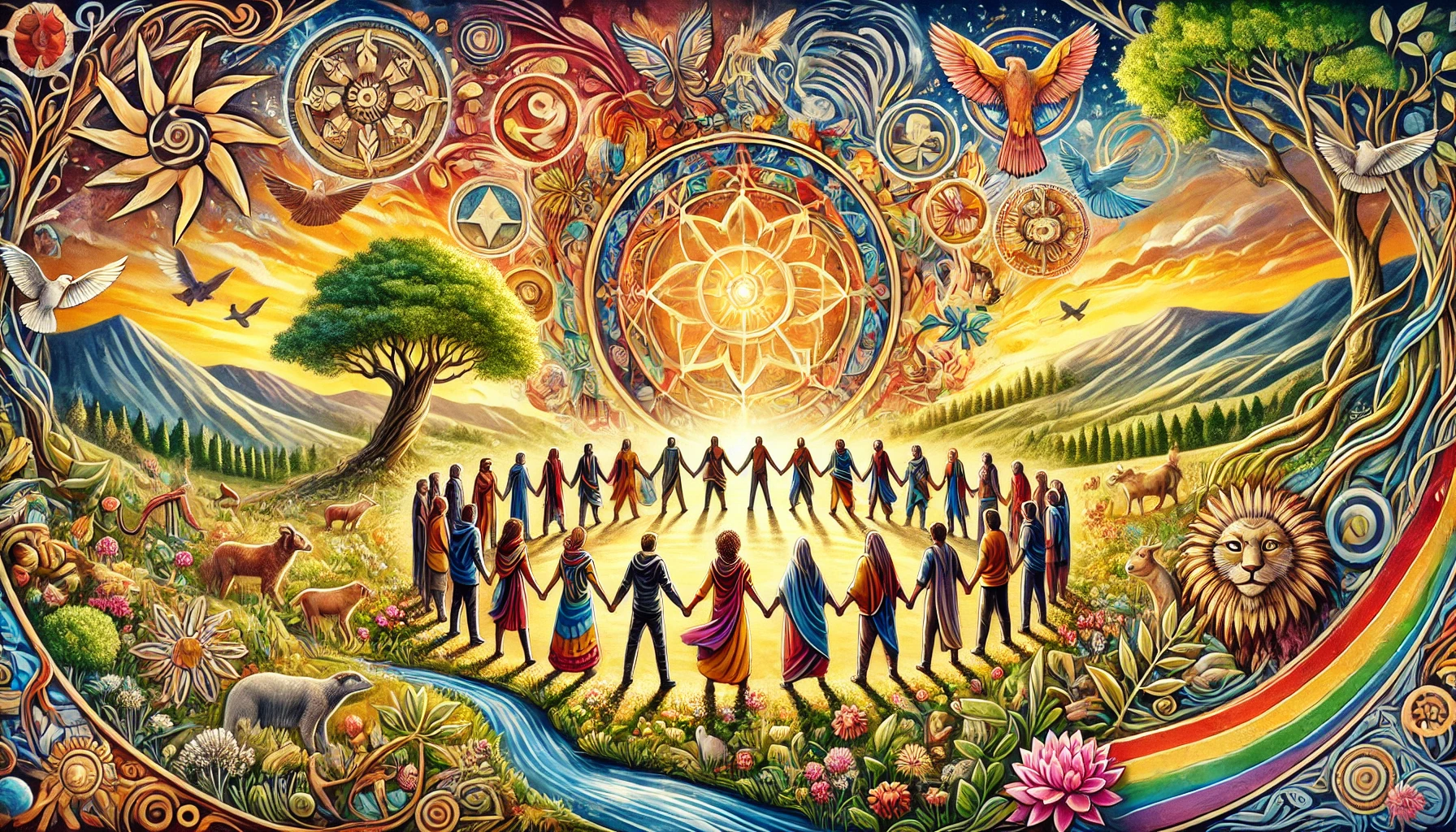In this post…
The term “woke” has become both a rallying cry and a lightning rod, representing a commitment to social justice, diversity, equity, and inclusion (DEI). Surprisingly to some, Paganism embodies these very principles. Paganism involves a deep respect for nature and interconnectedness. Because of this connection to nature, Paganism offers a worldview through which we can understand and embrace the ideals of DEI. Let’s explore how this ancient belief system aligns with today’s progressive values.
Nature as the Ultimate Equalizer
Paganism is a nature-based spirituality. This emphasis on nature makes Paganism a naturally “woke” path. Whether honoring the cycles of the moon, celebrating the changing seasons, or paying homage to the elements, Pagans draw wisdom and inspiration from the natural world. One of nature’s most profound lessons is its inherent diversity. Every organism plays a unique role in an untouched ecosystem, from the towering oak tree to the smallest insect. This interdependence creates nature’s resilience and balance, illustrating that strength lies in diversity.
Just as ecosystems thrive when all species are valued, human communities prosper when diverse voices and perspectives are included. By mirroring nature’s inclusivity, Paganism reminds us that every person contributes to the larger whole. No single species—or person—is inherently superior to another. This understanding naturally supports the principles of equity and inclusion that detractors like to refer to as “woke.”
The Sacredness of All Beings
Pagans often embrace the belief that all life is sacred, extending respect not just to humans but to animals, plants, and even inanimate objects (for Pagan animists). This worldview teaches us a profound sense of interconnectedness, breaking down hierarchical structures that place some beings above others. Such egalitarianism aligns with the modern push for equity, which seeks to dismantle systemic barriers and ensure that all individuals have access to the same opportunities and respect. This emphasis on equity in Pagan communities is another example of why Paganism tends to be “woke.” Nature teaches us that what we do to the environment, we do to ourselves. If we pollute the air we breathe, we pollute ourselves. The same is true of how we treat our fellow humans. If we pollute our relationships, we pollute our own ability to love and be loved.
Pagan rituals frequently honor marginalized or overlooked groups. For example, many Pagans celebrate deities from a variety of cultural pantheons, including those of African, Asian, Celtic, and Indigenous origins. This inclusivity underscores a recognition of the beauty and wisdom found in every culture and tradition.
Embracing the Divine in Diversity
Paganism’s pantheistic nature allows for an expansive view of divinity. While monotheistic religions often focus on a singular, all-powerful deity, Pagan traditions celebrate a multitude of gods and goddesses, each representing different aspects of life, nature, and humanity. This pluralistic approach encourages acceptance of diverse ways of being and believing.

In practice, this means that Pagan communities are often safe havens for people who feel excluded from more rigid religious systems. LGBTQIA+ individuals, for example, frequently find acceptance in Pagan circles, where the fluidity of gender and sexuality is celebrated rather than condemned. This doesn’t mean that all Pagan groups are open or accepting. There have been some bigoted examples of individual Pagans who turn out to be transphobic or homophobic, but for the most part, Pagan groups are much more accepting of our LGBTQIA+ members than are our Christian and Muslim counterparts. In other words, we tend to be more “woke” when it comes to acceptance of our differences. Similarly, those from varied racial and cultural backgrounds often find that Paganism’s emphasis on honoring ancestry and heritage resonates deeply.
Decolonizing Spirituality
Another way Paganism aligns with modern social justice movements is through its efforts to decolonize spirituality. Many Pagan practices draw from pre-Christian traditions that were suppressed or erased by colonial and imperial forces. By reviving and honoring these ancient ways, Pagans actively resist cultural erasure and promote a more inclusive understanding of spirituality.
This process often involves learning from and working in solidarity with Indigenous peoples, whose spiritual practices are similarly tied to nature and ancestral wisdom. Pagans who approach this work respectfully and collaboratively help to elevate marginalized voices and contribute to a broader movement of equity and justice.
Rituals that Unite, Not Divide
Pagan rituals are inherently communal and participatory, emphasizing unity and shared experience. Unlike hierarchical structures that place clergy above laypeople, most Pagan traditions encourage every participant to play an active role. This egalitarian approach fosters a sense of belonging and mutual respect.
Seasonal festivals like Samhain, Beltane, and the Solstices serve as reminders of the cyclical nature of life and the importance of community. These gatherings often include storytelling, music, and shared meals, creating spaces where people from all walks of life can connect and celebrate their common humanity.
Challenges and Opportunities
While Paganism’s principles align with DEI values, it’s essential to acknowledge that no community is perfect. Like any group, Pagan circles can struggle with issues of bias, privilege, and exclusion. However, the framework of most forms of Pagan spirituality offers powerful tools for addressing these challenges. By returning to nature’s lessons of balance and harmony, Pagans can continue to grow as inclusive and equitable communities.
Conclusion: Paganism as a Beacon of Inclusivity
While most of America right now finds itself grappling with division and inequality, all the while using the term “woke” as an insult, Paganism offers a refreshing perspective rooted in the interconnectedness of all life. I think that people who have been conditioned to use “woke” as an insult haven’t really looked very deeply into what it means. Sadly, I have even met some anti-woke people in the Pagan community, but I suspect those folks just haven’t looked deeply enough into what “woke” actually means. They need to wake up. Our celebration of diversity, respect for equity, and commitment to inclusion resonate with the principles of social justice. By embracing nature’s wisdom, Pagans demonstrate that “woke” values are not just modern inventions but timeless truths.
Whether you identify as a Pagan or are simply curious about its teachings, there’s much to learn from this ancient spirituality. At its heart, Paganism reminds us that we are all part of the same web of life, and our differences make us stronger. Perhaps it’s time to let nature guide us toward a more inclusive and equitable future.
Share Your Thoughts on “Woke” Paganism!
What do you think? Have you found Paganism to be more “woke” than other forms of spirituality? Share your thoughts in the comments below!
